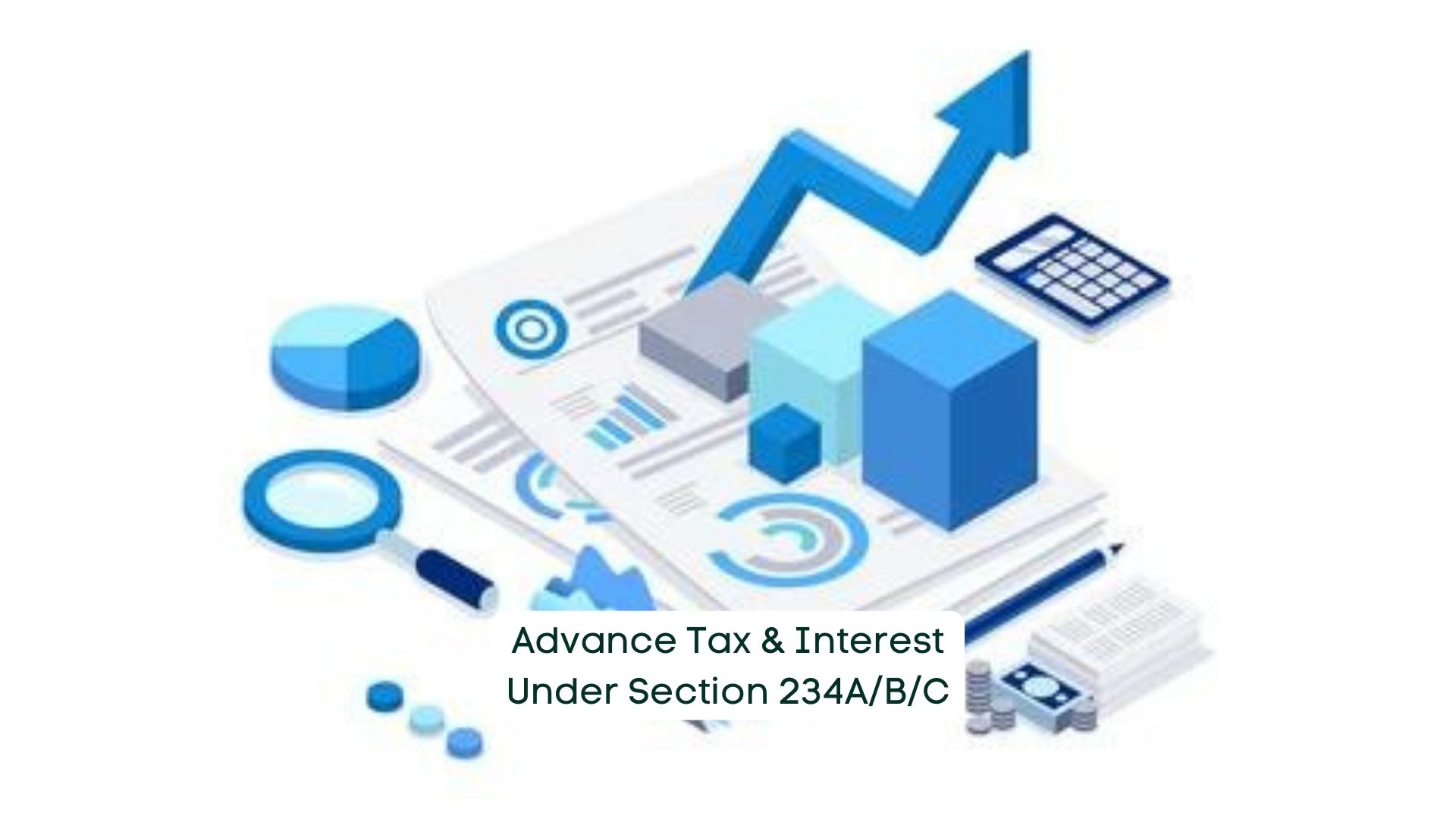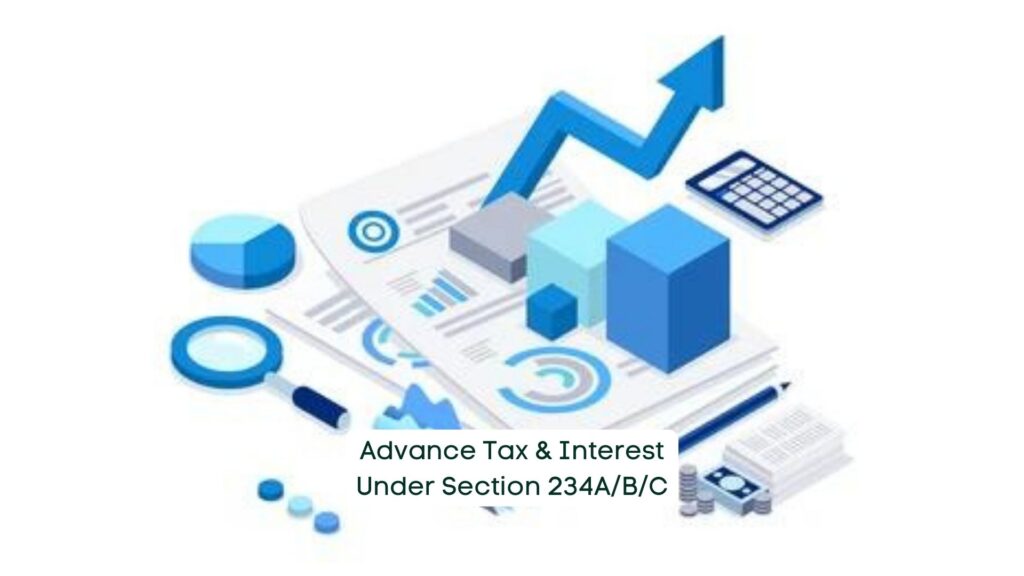
24 Feb Advance Tax & Interest Under Section 234A/B/C

The Income-tax Act imposed numerous forms of interest for various types of delays/defaults. This article discusses the provisions of sections 234A, 234B, and 234C of the Internal Revenue Code that dealt with interest charges.
- The failure to file a tax return on time
- Advance tax non-payment or underpayment
- Non-payment or underpayment of individual advance tax instalments or instalments (i.e., advance tax deferment).
What was Advance Tax?
Advance Tax gave the option of paying income tax in one lump sum at the end of the fiscal year in advance. The taxpayer had to pay:
- 15 percent advance tax by June 15th,
- 45 percent advance tax by September 15th,
- 75 percent advance tax by December 15th, and
- 100 percent advance tax by March 15th throughout the relevant fiscal year.
Interest for failure to file an income tax return [Section 234A]
If a taxpayer didn’t file their tax return on time, they were charged interest under section 234A.
Provisions that were fundamental
If a taxpayer didn’t file their tax return on time, they were charged interest under Section 234A. In other words, if a taxpayer filed his or her income tax return beyond the due date set forth in this section, interest was charged.
Interest rates
If a taxpayer didn’t file their tax return on time, they were charged interest under section 234A. The rate of interest was 1% every month or fraction of a month. Simple interest was the nature of interest. In other words, for any delay in completing the income tax return, the taxpayer was required to pay simple interest at the rate of one percent per month or part of a month.
Period for levy of Interest
Section 234A imposed interest for a fixed amount of time. Section 234A imposed interest beginning on the day after the due date for submitting the return of income and ending on the date of providing the return of income, or, if no return had been given, the date of completion of the assessment under section 234A.
A part of a month, i.e. a fraction of a month, was treated as a full month when computing the term of interest levy.
Interest-bearing amount
Section 234A charged interest on the amount of tax calculated by section 143(1), and, in the case of a regular assessment, the tax on total income as determined by advance tax, tax deducted/collected at source, relief sought under various sections such as 89/90/90A/91, and tax credit. The 115JAA/115JD section was used.
Interest for failure to pay advance tax [Section 234B]
Failure to pay advance tax could result in the imposition of interest under Section 234B.
Fundamental provisions
Interest was imposed under Section 234B in the following two situations:
- When a taxpayer failed to pay advance tax despite being obligated to do so; or .
- If the taxpayer’s advance tax payment was less than 90% of the total tax due.
If the assesses expected tax due for the fiscal year was ten thousand rupees or more, advance tax had to be paid by the taxpayer throughout the fiscal year, according to Section 208 of the Act.
Interest rate
Failure to pay advance tax resulted in a penalty of 1% each month or part of a month under Section 234B. Straightforward interest was the essence of interest. In other words, if a taxpayer failed to pay the advance tax, he or she had to pay simple interest at a rate of 1% per month or fraction of a month.
Interest-bearing amount
The amount of unpaid advance tax was subject to interest under Section 234B. If a taxpayer didn’t pay their advance tax on time, they were charged interest on the amount they didn’t pay..
Interest rate levy period
Section 234B imposed interest from the first day of the assessment year, April 1st, until the date of income determination under section 143(1), or, if a regular assessment was made, until the date of such a regular assessment.
If a taxpayer’s income rose as a result of an assessment or re-computation, they were charged interest under section 234B on the difference between the start day of the assessment year and the date of the assessment or re-computation. If an application was submitted to the Settlement Commission, interest would be charged on the differential amount from the first day of the assessment year to the date of the application, as provided in Section 234B.
In addition, if the Settlement Commission increased the income disclosed in the application, interest would be charged under section 234B on the difference between the first day of the assessment year and the date of the decision. If the person paid any tax before the assessment was completed, the following interest would be charged:
- Interest would be calculated on any unpaid advance tax up to the date of self-assessment tax payment.
- After deducting the self-assessment tax paid by the taxpayer from the date of payment of self-assessment tax, interest would be charged on the unpaid amount of advance tax.
Interest for failure to pay advance tax installment(s) [Section 234C]
Section 234C allowed for the imposition of interest if an advance tax instalment was not paid on time (s). Let us consider the provisions governing the payment of advance tax by a taxpayer before diving into the intricacies of Section 234C.
Anyone whose projected tax burden for the year exceeded Rs. 10,000 had to pay their tax in advance in the form of “advance tax” by the following dates, according to Section 208:
- If the advance tax paid before June 15th was less than 12% of the advance tax due
- If the advance tax paid on or before September 15th was less than 36 percent of the advance tax due, the advance tax was not refundable.
- If the amount of advance tax paid on or before December 15th was less than 75% of the total amount due,
- If the advance tax paid on or before March 15th did not equal 100% of the advance tax due.
If the first, second, and third instalments were not paid on time, Section 234C charged interest at a rate of 1% for three months, and one month if the last instalment was not paid on time.
Conclusion:
When a taxpayer’s tax liability in a fiscal year exceeded Rs. 10,000, they were normally required to pay advance tax. Taxpayers who planned ahead of time might have been able to pay their taxes on time. They would, however, have been penalized with interest under Section 234B of the Income Tax Act if they missed or postponed making the payment. They could have faced penalties under sections 234A and 234C as well.


No Comments